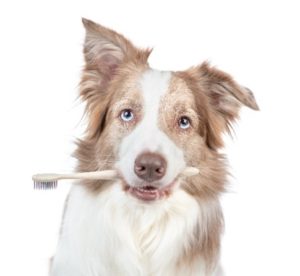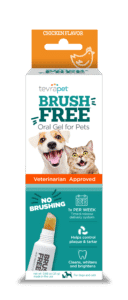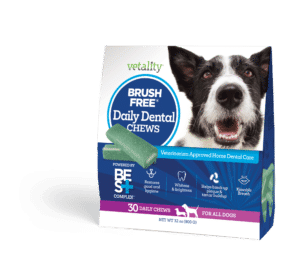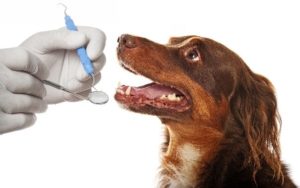Pet Health, Tevra Brands, TevraPet, Vetality
Pet Dental Health 101
Pet Dental Health 101
As a loving pet parent, you do everything possible to keep your dog happy and healthy. We’re sure you feed him a high-quality diet, keep up on flea prevention, and visit your veterinarian for his annual checkup, but what about his dental care? Over eighty percent of our dogs suffer from canine periodontal disease by their third birthday, so if doggie oral hygiene isn’t on your radar, you’re definitely not alone. However, keeping your dog’s teeth healthy can prevent a lot of problems later. This guide will explain the importance of canine dental health and provide some convenient, easy, and delicious ways to care for your dog’s teeth.
What does a healthy mouth look like?
Understanding what your dog’s mouth looks like when he is healthy will make it easier for you to notice any problems. Healthy dog teeth should be clean and free of plaque or tartar. All forty-two of your dog’s teeth should be intact, not jagged or broken. The tongue should be moist, without any signs of lumps or cuts. In most cases, your dog’s gums should be pink, although a few breeds have naturally black or black-and-pink gums. Take some time and learn what your dog’s mouth normally looks like. Talk to your vet if you notice lumps, spots, pale gums, or bright-red tissue.
Importance of regular dental care
Regular dental care is extremely important for our dogs for the same reasons it’s important for humans. Common problems associated with poor dental health can include:
- Bad breath.
- Teeth getting lost or falling out.
- Mouth pain. Severe dental disease can be extremely painful for both dogs and cats.
- Organ damage. If left untreated, the bacteria from your dog’s mouth can enter the bloodstream. From there, it can spread to the heart, kidneys, and liver, causing numerous secondary health problems.
What is canine dental disease?
Periodontal disease typically affects our dogs’ gums, teeth, or other parts of the mouth and jaw. It generally starts with a simple build-up of plaque on the tooth enamel. If the plaque isn’t removed, it remains on the teeth and hardens into tartar. When tartar builds up enough to be above the gumline, it can be removed relatively easily during a professional cleaning by your veterinarian.
Tartar that makes its way below the gumline is the real problem. Tartar below the gumline creates inflammation, causes infection, and may ultimately damage the structures supporting your dog’s teeth. All of these symptoms can be very painful and quite expensive to treat. Fortunately, it has become easier than ever to fight canine periodontal disease.
As with many things, prevention is always the best course of action. Until recently, the only way to clean our dog’s teeth was to brush them using a special toothbrush and doggie toothpaste. While this method is effective, it’s not very popular with our dogs. If you decide to brush your dog’s teeth, remember to use toothpaste designed specifically for dogs. Human toothpaste contains sweeteners and other ingredients that are toxic to most dogs. Also, it generally takes time and training to accustom dogs to teeth brushing. Here are a few dental health tips and tricks that your dog might like better.
- Dental rinses and water additives. These products can be mixed with your dog’s water supply. They contain enzymes and other ingredients designed to fight plaque and tarter. As with toothpaste, do not use products designed for humans with your dog. They contain ingredients that are harmful to pets.
- Dental wipes. These wipes can be rubbed on your dog’s gums and teeth. They tend to be easier than a toothbrush, and a very popular dental health solution.
- Brush-free oral gel. Brush-free oral gel tastes delicious, and it’s very easy to use. Just rub some gel on your pet’s gums, the prolong technology, a patented timed-release delivery system bonds to the gums creating a biofilm that slowly releases the dental actives, chlorhexidine & baking soda. The best thing about Brush Free Oral Gel is that you only need apply it to your pet’s gums once a week for a clean mouth, white teeth, and fresh breath.
- Dental treats and chews. There are a number of treats designed to help clean your dog’s teeth while tasting delicious. Not all dental chews are created equal. You will want to read the label to see if it is only the shape that promotes cleaning and scraping of teeth or if they have actives in the formula that contribute to good oral health. We recommend these tasty daily dental chews as they provide actives that provide real dental benefits.
- Prescription diets. There are special diets for almost every canine health condition, and that definitely includes dental health. Feeding your pup one of these diets may take a bit longer to work than the other methods we’ve discussed, but some pet parents swear by it.
Professional dental cleanings
If you notice that your dog’s teeth look discolored, or if his breath just isn’t getting better after you’ve tried over the counter dental care products, your vet can help. Most clinics now offer professional dental cleanings Your vet can determine if your dog needs his teeth professionally cleaned by doing a quick exam. One major difference between your dog’s dental cleaning and your own is that your dog will require general anesthesia and any risk that is associated with any procedure that requires it. While he’s asleep, your vet will take x-rays and carefully examine the teeth, gums, and other parts of the mouth. Also, they’ll use special tools to scrape off all tartar and plaque. If your dog needs any complicated dental work, like extractions or root canals, you’ll probably be referred to a veterinary dental specialist.
Most veterinarians recommend annual dental exams and cleanings. The good news is that pet parents who care for their pet’s teeth at home can often avoid this extra expense, along with the other health problems associated with severe periodontal disease. Regular dental care at home will get rid of that bad breath, keep your pet healthy, and save you the trouble and cost of professional cleanings. Plus, you’ll score extra points with your vet. Trust us, your pet will thank you!







